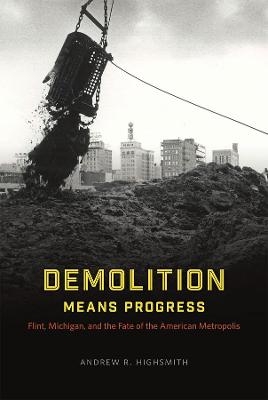
Demolition Means Progress
Flint, Michigan, and the Fate of the American Metropolis
Seiten
2015
University of Chicago Press (Verlag)
978-0-226-05005-8 (ISBN)
University of Chicago Press (Verlag)
978-0-226-05005-8 (ISBN)
In 1997, after General Motors shuttered a massive complex of factories in the gritty industrial city of Flint, Michigan, workers placed signs around the empty facility reading. This book suggests that the struggling city could not move forward to greatness until the old plants met the wrecking ball.
In 1997, after General Motors shuttered a massive complex of factories in the gritty industrial city of Flint, Michigan, workers placed signs around the empty facility reading, "Demolition Means Progress," suggesting that the struggling city could not move forward to greatness until the old plants met the wrecking ball. Much more than a trite slogan, the phrase encapsulates the operating ethos of the nation's metropolitan leadership from at least the 1930s to the present. Throughout, the leaders of Flint and other municipalities repeatedly tried to revitalize their communities by demolishing outdated structures and institutions and overseeing numerous urban renewal campaigns - many of which yielded only a more impoverished and more divided metropolis. After decades of these efforts, the dawn of the twenty-first century found Flint one of the most racially segregated and economically polarized metropolitan areas in the nation. In one of the most comprehensive works yet written on the history of inequality and metropolitan development in modern America, Andrew R.
Highsmith uses the case of Flint to explain how the perennial quest for urban renewal - even more than white flight, corporate abandonment, and other forces - contributed to mass suburbanization, racial and economic division, deindustrialization, and political fragmentation. Challenging much of the conventional wisdom about structural inequality and the roots of the nation's urban crisis, Demolition Means Progress shows in vivid detail how public policies and programs designed to revitalize the Flint area ultimately led to the hardening of social divisions.
In 1997, after General Motors shuttered a massive complex of factories in the gritty industrial city of Flint, Michigan, workers placed signs around the empty facility reading, "Demolition Means Progress," suggesting that the struggling city could not move forward to greatness until the old plants met the wrecking ball. Much more than a trite slogan, the phrase encapsulates the operating ethos of the nation's metropolitan leadership from at least the 1930s to the present. Throughout, the leaders of Flint and other municipalities repeatedly tried to revitalize their communities by demolishing outdated structures and institutions and overseeing numerous urban renewal campaigns - many of which yielded only a more impoverished and more divided metropolis. After decades of these efforts, the dawn of the twenty-first century found Flint one of the most racially segregated and economically polarized metropolitan areas in the nation. In one of the most comprehensive works yet written on the history of inequality and metropolitan development in modern America, Andrew R.
Highsmith uses the case of Flint to explain how the perennial quest for urban renewal - even more than white flight, corporate abandonment, and other forces - contributed to mass suburbanization, racial and economic division, deindustrialization, and political fragmentation. Challenging much of the conventional wisdom about structural inequality and the roots of the nation's urban crisis, Demolition Means Progress shows in vivid detail how public policies and programs designed to revitalize the Flint area ultimately led to the hardening of social divisions.
Andrew R. Highsmith is assistant professor of public administration and an affiliated faculty member in history and urban and regional planning at the University of Texas at San Antonio.
| Erscheint lt. Verlag | 17.7.2015 |
|---|---|
| Reihe/Serie | Historical Studies of Urban America |
| Sprache | englisch |
| Maße | 17 x 24 mm |
| Gewicht | 652 g |
| Themenwelt | Geisteswissenschaften ► Geschichte ► Regional- / Ländergeschichte |
| Naturwissenschaften ► Geowissenschaften ► Geografie / Kartografie | |
| Sozialwissenschaften ► Soziologie | |
| ISBN-10 | 0-226-05005-X / 022605005X |
| ISBN-13 | 978-0-226-05005-8 / 9780226050058 |
| Zustand | Neuware |
| Haben Sie eine Frage zum Produkt? |
Mehr entdecken
aus dem Bereich
aus dem Bereich
Erinnerungen
Buch | Softcover (2024)
Pantheon (Verlag)
16,00 €


